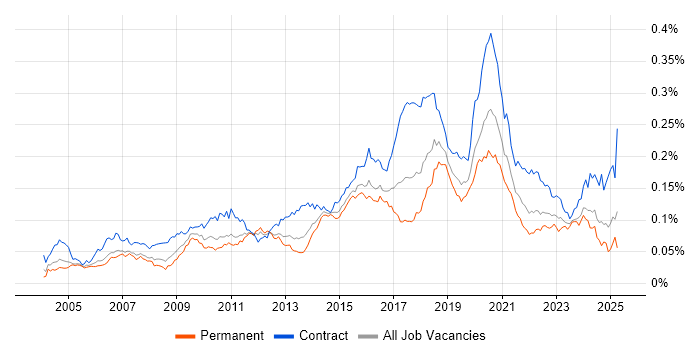Integration Developer
UK
The median Integration Developer salary in the UK is £62,500 per year, according to job vacancies posted during the 6 months leading to 7 May 2025.
The table below provides salary benchmarking and summary statistics, comparing them to the same period in the previous two years.
| 6 months to 7 May 2025 |
Same period 2024 | Same period 2023 | |
|---|---|---|---|
| Rank | 668 | 814 | 899 |
| Rank change year-on-year | +146 | +85 | +236 |
| Permanent jobs requiring an Integration Developer | 32 | 98 | 81 |
| As % of all permanent jobs advertised in the UK | 0.059% | 0.099% | 0.078% |
| As % of the Job Titles category | 0.065% | 0.10% | 0.086% |
| Number of salaries quoted | 27 | 90 | 66 |
| 10th Percentile | £42,246 | £50,450 | £40,125 |
| 25th Percentile | £46,250 | £52,500 | £49,250 |
| Median annual salary (50th Percentile) | £62,500 | £60,000 | £60,000 |
| Median % change year-on-year | +4.17% | - | +8.81% |
| 75th Percentile | £76,250 | £70,000 | £79,063 |
| 90th Percentile | £92,000 | £82,500 | £82,500 |
| UK excluding London median annual salary | £50,000 | £55,000 | £42,500 |
| % change year-on-year | -9.09% | +29.41% | -15.00% |
All Permanent IT Job Vacancies
UK
For comparison with the information above, the following table provides summary statistics for all permanent IT job vacancies. Most job vacancies include a discernible job title that can be normalized. As such, the figures in the second row provide an indication of the number of permanent jobs in our overall sample.
| Permanent vacancies in the UK with a recognized job title | 49,015 | 93,487 | 94,651 |
| % of permanent jobs with a recognized job title | 90.41% | 94.63% | 91.53% |
| Number of salaries quoted | 27,518 | 67,038 | 59,603 |
| 10th Percentile | £30,000 | £28,500 | £32,500 |
| 25th Percentile | £42,000 | £38,500 | £45,000 |
| Median annual salary (50th Percentile) | £57,500 | £52,550 | £60,000 |
| Median % change year-on-year | +9.42% | -12.42% | - |
| 75th Percentile | £75,000 | £71,250 | £81,250 |
| 90th Percentile | £97,500 | £90,000 | £100,000 |
| UK excluding London median annual salary | £52,000 | £50,000 | £53,000 |
| % change year-on-year | +4.00% | -5.66% | +6.00% |
Integration Developer
Job Vacancy Trend
Job postings that featured Integration Developer in the job title as a proportion of all IT jobs advertised.

Integration Developer
Salary Trend
3-month moving average salary quoted in jobs citing Integration Developer.
Integration Developer
Salary Histogram
Salary distribution for jobs citing Integration Developer over the 6 months to 7 May 2025.
Integration Developer
Top 11 Job Locations
The table below looks at the demand and provides a guide to the median salaries quoted in IT jobs citing Integration Developer within the UK over the 6 months to 7 May 2025. The 'Rank Change' column provides an indication of the change in demand within each location based on the same 6 month period last year.
| Location | Rank Change on Same Period Last Year |
Matching Permanent IT Job Ads |
Median Salary Past 6 Months |
Median Salary % Change on Same Period Last Year |
Live Jobs |
|---|---|---|---|---|---|
| England | +117 | 29 | £63,750 | +6.25% | 33 |
| London | +88 | 16 | £73,000 | +20.66% | 14 |
| Work from Home | +123 | 14 | £70,000 | +20.17% | 18 |
| UK excluding London | +146 | 12 | £50,000 | -9.09% | 25 |
| South East | +87 | 5 | £45,000 | -28.00% | 6 |
| Midlands | +55 | 5 | £75,000 | +28.76% | 5 |
| West Midlands | +42 | 4 | £75,000 | +25.00% | 3 |
| Yorkshire | +69 | 1 | £46,000 | -34.29% | 1 |
| East Midlands | +48 | 1 | - | - | 2 |
| North of England | +38 | 1 | £46,000 | -16.36% | 3 |
| East of England | +37 | 1 | £60,000 | - | 4 |
Integration Developer Skill Set
Top 30 Co-occurring Skills and Capabilities
For the 6 months to 7 May 2025, Integration Developer job roles required the following skills and capabilities in order of popularity. The figures indicate the absolute number co-occurrences and as a proportion of all permanent job ads featuring Integration Developer in the job title.
|
|
Integration Developer Skill Set
Co-occurring Skills and Capabilities by Category
The follow tables expand on the table above by listing co-occurrences grouped by category. The same employment type, locality and period is covered with up to 20 co-occurrences shown in each of the following categories:
|
|
|||||||||||||||||||||||||||||||||||||||||||||||||||||||||||||||||||||||||||||||||||||||||||||
|
|
|||||||||||||||||||||||||||||||||||||||||||||||||||||||||||||||||||||||||||||||||||||||||||||
|
|
|||||||||||||||||||||||||||||||||||||||||||||||||||||||||||||||||||||||||||||||||||||||||||||
|
|
|||||||||||||||||||||||||||||||||||||||||||||||||||||||||||||||||||||||||||||||||||||||||||||
|
|
|||||||||||||||||||||||||||||||||||||||||||||||||||||||||||||||||||||||||||||||||||||||||||||
|
|
|||||||||||||||||||||||||||||||||||||||||||||||||||||||||||||||||||||||||||||||||||||||||||||
|
|
|||||||||||||||||||||||||||||||||||||||||||||||||||||||||||||||||||||||||||||||||||||||||||||
|
|
|||||||||||||||||||||||||||||||||||||||||||||||||||||||||||||||||||||||||||||||||||||||||||||
